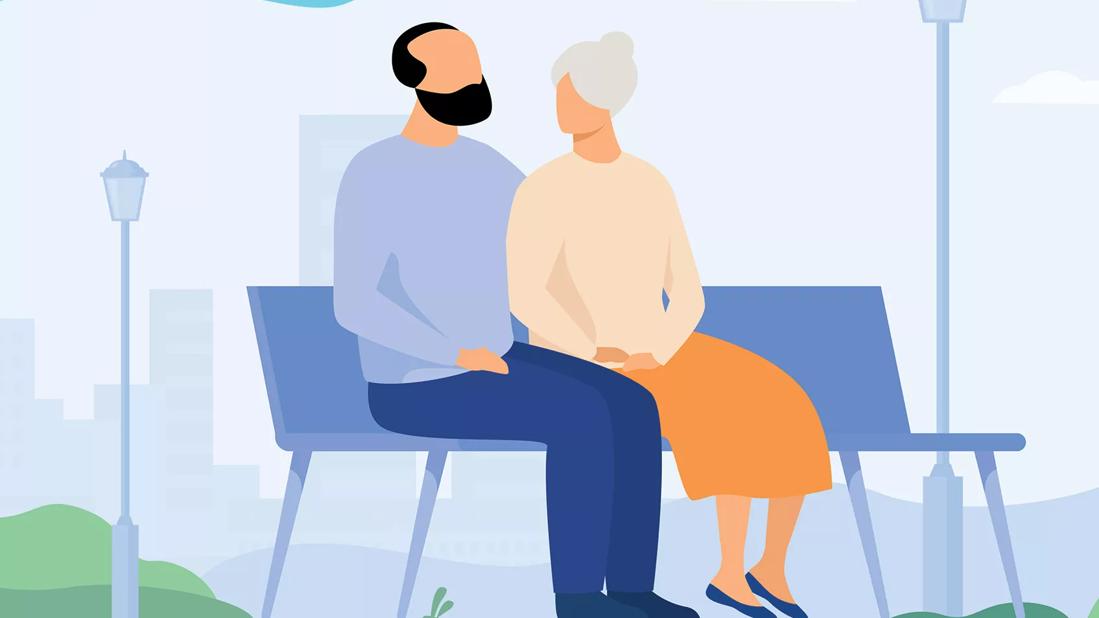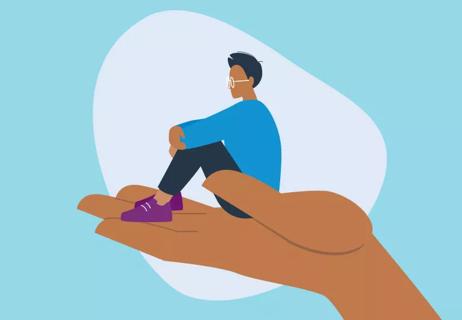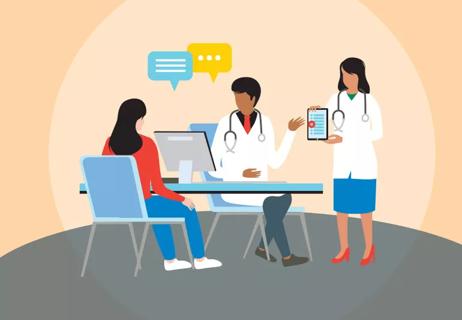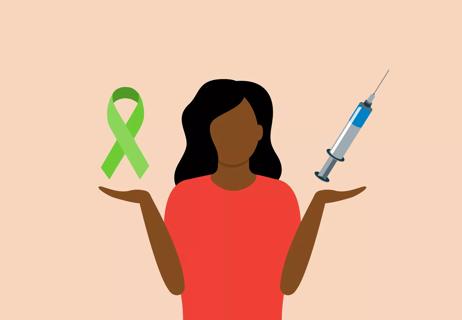Listen to them, field questions from family and friends, and provide some normalcy

A cancer diagnosis can be shocking and upsetting, not just for the person receiving the diagnosis, but also for their loved ones. It can be hard to process the news at first and difficult to reconcile the information being given. Not to mention, you may have a lot of questions about their lymphoma diagnosis and treatment options.
Advertisement
Cleveland Clinic is a non-profit academic medical center. Advertising on our site helps support our mission. We do not endorse non-Cleveland Clinic products or services. Policy
Regardless of how they respond to their diagnosis, their loved ones can be an essential source of support by taking on the role of supporter and caregiver. Along the way, it’s also important for caregivers to remember to also take care of themselves.
Oncology social worker Jane Dabney, LISW-S, OSW-C, offers ways you can support your loved one after they receive a lymphoma diagnosis.
Lymphoma is a type of blood cancer that develops when white blood cells (called lymphocytes) lose control of their cell division process and change into rapidly growing cancer cells that don’t die. Usually, lymphocytes work to monitor and destroy foreign invaders like bacteria, viruses, parasites and fungi as they travel throughout your body in your lymphatic system.
But when they become cancerous, that means you could develop cancer anywhere within your lymphatic system, including your bone marrow, spleen, lymph nodes and other organs. In fact, there are more than 70 different kinds of lymphoma, and each one responds to treatment differently.
It’s a lot for someone to take in, but that doesn’t mean your loved one has to navigate processing their diagnosis or treatment plan alone. Here are a few things you can do to help:
Advertisement
When receiving the diagnosis, Dabney says it’s important to ask for information about what’s to come, especially in addition to any questions your loved one might have about their lymphoma diagnosis or treatment. This can include:
“It’s always good to jot down questions when you think of them and take them with you to appointments,” says Dabney. “We find that during those early days of the diagnosis, both the patient and their family members may feel overwhelmed with information and emotions. It can be difficult to remember all of your questions and sometimes difficult to get a good night’s rest.”
It can be helpful to keep a notebook at your bedside to write down any questions you have when you can’t sleep so you can give your mind enough space to relax.
Making sure you’re on the same page as your loved ones with questions and concerns is another important aspect of treatment. Talking about the questions you each have and sharing questions helps strengthen communication with their care team.
As the lymphoma treatment process begins, there are ways that you and your loved one’s support system can continue to help. Whether that means being an advocate for them or just taking a moment for yourselves along the way, Dabney offers some suggestions to assist someone throughout the treatment process.
“One of the biggest things to do is to listen and be present,” encourages Dabney. “Listen to their feelings and collaborate with them on how they want to approach the next steps in the treatment plan.”
Each person digests news differently, and that’s true for anyone, especially those who are trying to offer their support. You can work together with the person who has a lymphoma diagnosis by deciding when to begin telling family and friends about their diagnosis and expanding your support network.
“Some like to process the news before they share it with others, while some like to tell family right away, before they know the total treatment plan,” Dabney notes. “Be willing to work together and respect someone’s preferences.”
When someone receives a cancer diagnosis, sometimes, the outpouring of support can be almost overwhelming. Friends and family might stop by or reach out to see what they can do or ask to visit. In these instances, Dabney says the caregiver should politely serve as a gatekeeper, making sure both of you aren’t feeling too overwhelmed with visitors.
Advertisement
“People generally mean well when they offer help or want to visit,” Dabney says. “If it’s not a good time, you can politely tell them neither you nor your partner is available for a visit.”
During treatment, your loved one will have good and bad days. Along the way, it can be helpful to try to have a sense of normalcy. Stick to old routines you both loved before they received their diagnosis or create new ones that are more manageable, but try to be consistent.
Having a sense of normalcy provides a sense of purpose and sometimes allows someone to pivot their focus to potentially more positive things. And, if there are household tasks or chores to be done, offering a list of items or tasks to people who can help from outside of the home can be another source of support that takes some pressure off you and your loved one.
Dabney says you can be a politely assertive advocate for someone when dealing with their care team throughout treatment by scheduling appointments, maintaining their schedules and speaking up when something doesn’t feel right.
“If they have needs that you feel aren’t being met, talk to the care team to make sure your concerns are heard,” advises Dabney.
Of course, that doesn’t mean you should take control of anything without consent of the person who has a lymphoma diagnosis. While so much of your time as a caregiver is about providing support, it’s also important to acknowledge that they have the right to make their own decisions. Whether it’s about the type of treatment, support network or getting a second opinion, Dabney says it’s important to partner with your loved one and respect their thoughts and perspectives.
Advertisement
Related to this is offering choices to the person who’s been diagnosed with lymphoma. “Simple things like giving them food choices, asking them if they want to see visitors or even just sitting outside can help them feel like they have some control over their situation,” says Dabney.
It’s also important to remember to help with tasks someone isn’t able to do, and encourage them to continue to do the things they can and want to do for themselves. Chores like paying bills or cooking meals are some examples.
“Offer assistance but don’t take away the option from them unless they ask,” she adds.
Dabney says that it’s not unusual to encounter some unexpected road bumps along the way. Often, lymphoma treatment can have a number of side effects that make the experience of treatment difficult. At times, treatment may also need to be adjusted or changed depending on how your loved one responds to it.
“Sometimes, you might come in for an appointment or treatment and when blood is drawn for lab work, it’s discovered your partner needs a transfusion,” poses Dabney. “Now, you’re here longer than you originally thought you’d be, and that unexpected outcome can feel stressful in the moment.”
Learning to be flexible is a key part of treatment. Having a backup plan to care for children and pets, etc., can also be helpful in these situations — and being able to rely on your support system in these instances can be a tremendous benefit.
Advertisement
Because these twists and turns in treatment can throw you off, it’s important to try to focus on things you can still do.
“You can’t control the diagnosis or what the treatment regimen is going to be,” Dabney cautions. “But you can choose how you’re going to approach the treatment appointments. You can control taking care of yourself, and making decisions of who you ask for help and support. You can take charge of building a support network of people whom you can delegate tasks to.”
While the idea of caregivers giving themselves time for their own self-care may not be top of mind during this period, Dabney recognizes how essential self-care can be in order to remain helpful to other people.
“We encourage caregivers to make sure they’re providing good self-care to themselves. If they don’t recharge their own batteries, they won’t be able to care for someone else,” she notes.
From the unexpected during lymphoma treatment to other sacrifices that have to be made — as the caregiver, you can experience stress, too. Allowing others to support you is essential.
“Having negative emotions, crying and being upset is not always a bad thing. Staying positive all the time isn’t a must,” Dabney stresses. “You can feel what you feel. If you stay down in the dumps and overwhelmed for days, then you need to seek help and talk about it. But otherwise, it’s all part of the process for both the person living with a cancer patient and their caregiver.”
Some things you can do to boost your self-care include:
Self-care is also about asking others to help share the load, even as a caregiver. Some things you can ask for help with include:
One additional task a caregiver can do is to determine a more streamlined way of informing loved ones about the continuing treatment process. Dabney suggests using a website like CaringBridge to provide updates to everyone at once, so you don’t have to contact each friend and family member individually every time there’s an update.
Getting support from the care team can also help in terms of finding resources you can rely on, whether it’s assistance with tasks or simply finding support groups for you or your loved one with lymphoma. The oncology social worker is an essential part of the healthcare team and can help caregivers with supportive counseling, coping techniques and finding resources.
Other valuable resources may include:
“Caregivers who take time for themselves and care for themselves have more energy to continue caregiving for the long haul,” Dabney states. “Give yourself a break because you may make mistakes or end up not doing what you intended. No matter what happens, it’s important to acknowledge you’re doing the best you can.”
Learn more about our editorial process.
Advertisement

It’s important to take time for yourself as you go through your cancer journey

A support system you trust and a care team you’re comfortable with can help you adjust

Certain foods like whole grains, eggs and nuts can boost your well-being during treatment

Vaccination is a good idea before or after treatment

Calling 911 or emergency services should always be your first step

Both leukemia and lymphoma are blood cancers — but one is found in your bone marrow, while the other is found in your lymph nodes

Rates of early-onset breast, colorectal and GI cancers are increasing, but preventive care and a healthy lifestyle can help reduce your risk

Getting close to their care team, investing in accessibility and implementing safe sleeping practices are just a few ways to support your child’s growth and development

The tropical fruit is a good source of antioxidants and vitamin C

Most people fall asleep within 10 to 20 minutes, but if your experience is different, adjusting your sleep schedule may help

Exploring your hidden side can lead to better understanding of what makes you tick